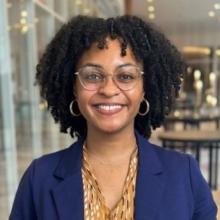1. In a few sentences, what is your role at the agency you work for?
My role at the Office of Head Start in the Policy and Planning Division is largely centered on supporting Head Start’s lead in water and paint portfolio. I review current Head Start regulations and training and technical assistance (TTA), maintain partnerships with key stakeholders, examine differences in state regulations for implementing lead testing programs, and aggregate funding announcements to test for and mitigate lead exposure in child care facilities and schools. I have also had the opportunity to delve into Tribal policy by supporting federal staff in assessing the impact of current regulations, rules and TTA on American Indian/Alaska Native Head Start programs.
2. What interested you in becoming an SRCD Policy Fellow?
As a neuroscientist, my research focused on the role of the environment on reading skills and brain development in youth. It is hard to reckon with the overwhelming number of Black and Latine children that live in communities with environmental health hazards that could impact developmental outcomes. I became interested in the SRCD Executive Branch Policy Fellowship because I wanted to gain expertise in the evaluation and implementation of policies that support children and families in low income communities. Working at the Office of Head Start has expanded my ability to research and analyze current policies and assess equitable policy options and solutions.
3. What has been the most memorable project you have completed during your time at the agency?
I was at the Office of Head Start for 5 months when I dove headfirst into the federal rule making process. I was designated as the lead for a specific policy area, and responsible for reviewing all the public comments and considering how to formulate policy options and recommendations for leadership consideration. This experience was monumental to me because I was able to have a front row seat into the regulatory development process.
4. What words of wisdom might you pass on to someone who is interested in SRCD’s fellowship program?
Learn to be okay with the uncomfortable. Stepping outside of your comfort zone helps you become adaptable, promotes critical thinking and a growth mindset. There may be a project you are asked to assist on that is completely outside of your wheelhouse, but you may gain valuable experiences that will help you personally and professionally. Also, recognize that a learning curve is normal when entering a new field. Do not be ashamed to ask for help if you need it and know that you are more than capable of succeeding!
5. What piqued your interest in working in policy?
In my 4th year of graduate school, I became a member of the National Science Policy Network which aims to expose early career scientists to education and training in science policy, communication, and advocacy. I became a National Science Policy Network Scholar to gain experience in communicating complex scientific concepts to the public and elected officials. I was paired with the non-profit organization Science for Georgia and developed recommendations to improve literacy outcomes in early childhood. I also worked with literacy organizations to advocate to the Education Committee of the Georgia House of Representatives for Reading Awareness Month to be recognized in March, which uses a scientific approach to improve reading outcomes for youth. As a postdoctoral research fellow at Columbia University, I gained additional skills in communicating my science to NYC legislators which showed me the value of integrating science into society and potential policy development. These experiences propelled me to apply for the SRCD Executive Branch Policy Fellowship because I wanted to further my understanding of the role of science in the federal government and how policies can impact the early childhood system.
6. What has been an interesting professional development opportunity you have completed during the fellowship?
I had the opportunity to attend the Native American Child and Family Conference in Albuquerque, New Mexico. My participation was not only as an attendee, but as a notetaker for a roundtable discussion on the Office of Head Start Tribal Request for Information, published in the Federal Register. I collected feedback from Tribal stakeholders on the successes and challenges of current regulations and training and technical assistance on American Indian/Alaska Native (AIAN) Head Start programs. The experience was immensely humbling in my understanding of Tribal Sovereignty and the importance of respecting their autonomy as decision makers and thought leaders in the policy and programmatic process. I enjoyed learning about the richness of culture, community and language that exists within Tribal communities and how to support their efforts in providing high-quality AIAN Head Start programs and services.
7. What is your favorite book?
Homegoing by Yaa Gyasi. The book is a historical fiction novel about the pathways of two half-Ghanian sisters and their descendants. It’s a beautiful story about the intricacies of our ancestral connections and how they will always lead us home.
